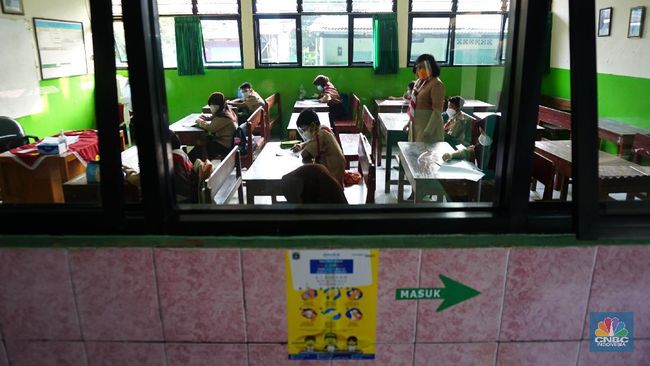Jakarta, CNBC Indonesia – The government has decided to extend the policy for the Implementation of Restrictions on Community Activities or PPKM until August 9, 2021. So what is the plan for face-to-face schools?
Minister of Education and Culture, Nadiem Makarim, said the face-to-face learning rules are regulated in the Joint Decree (SKB) of the four ministers and prioritizes prudence and the health of all parties.
For information, President Joko Widodo (Jokowi) promised to gradually open the PPKM on July 26, 2021 if the case slopes down. However, in the end, the policy was extended until August 2 and the latest until August 9, 2021.
The SKB itself contains in the 2021-2022 school year, schools are given the option of doing limited PTM. It aims to avoid negative impacts on students.
“But learning will take place dynamically and adjust to ongoing health risks, namely if PPKM, whether Micro PPKM or Emergency, there must be modifications. There must be changes that occur,” said Nadiem, in CNBC Indonesia Economic Update: Indonesia’s Economic Awakening, quoted Tuesday (2/2). /8/2021).
In the last Emergency PPKM, for example, there were seven provinces that were required to conduct distance learning (PJJ). All areas are prohibited from conducting limited face-to-face learning until the policy ends.
The seven bloods are DKI Jakarta, Banten, West Java, Central Java, Special Region of Yogyakarta, East Java, and Bali.
“Education units outside the seven provinces can provide limited face-to-face options according to the predetermined SKB,” explained Nadiem.
It was emphasized that the seven provinces had not been allowed to conduct face-to-face learning. Meanwhile, outside of that, according to him, parents have full authority to allow their children to do limited PTM or distance learning (PJJ).
Some time ago, Nadiem revealed the reason for limited face-to-face schools to be opened. Because long-term PJJ activities have a negative impact on children.
For example, children experience boredom at home with a lot of video conferencing being done. In addition, learning conditions are not dynamic, lonely and students experience depression because they do not meet their friends and teachers.
There are also domestic problems, from stress caused by too much interaction at home and not going out of the house. There is also the problem of inadequate infrastructure and technology.
“Infrastructure and technology are also inadequate. It is clear that this PJJ has taken too long and we cannot wait any longer and sacrifice the health and mentality of our students,” he explained.
(roy/roy)
– .


